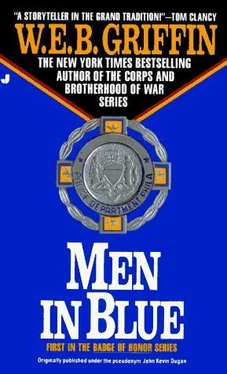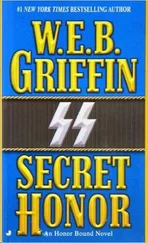W.E.B Griffin - Men In Blue
Здесь есть возможность читать онлайн «W.E.B Griffin - Men In Blue» весь текст электронной книги совершенно бесплатно (целиком полную версию без сокращений). В некоторых случаях можно слушать аудио, скачать через торрент в формате fb2 и присутствует краткое содержание. Жанр: Полицейский детектив, на английском языке. Описание произведения, (предисловие) а так же отзывы посетителей доступны на портале библиотеки ЛибКат.
- Название:Men In Blue
- Автор:
- Жанр:
- Год:неизвестен
- ISBN:нет данных
- Рейтинг книги:4 / 5. Голосов: 1
-
Избранное:Добавить в избранное
- Отзывы:
-
Ваша оценка:
- 80
- 1
- 2
- 3
- 4
- 5
Men In Blue: краткое содержание, описание и аннотация
Предлагаем к чтению аннотацию, описание, краткое содержание или предисловие (зависит от того, что написал сам автор книги «Men In Blue»). Если вы не нашли необходимую информацию о книге — напишите в комментариях, мы постараемся отыскать её.
Men In Blue — читать онлайн бесплатно полную книгу (весь текст) целиком
Ниже представлен текст книги, разбитый по страницам. Система сохранения места последней прочитанной страницы, позволяет с удобством читать онлайн бесплатно книгу «Men In Blue», без необходимости каждый раз заново искать на чём Вы остановились. Поставьте закладку, и сможете в любой момент перейти на страницу, на которой закончили чтение.
Интервал:
Закладка:
"Bobby, this is Mickey. Did they come out?"
"Nice," the city editor said. "How much more is there?"
"How much space can I have?"
"Pictures?"
"Two good ones for sure," Mickey said. "I got a lovely shot of the severed head."
"I mean ones we can print, Mickey," the city editor said. He pointed to the telephone in Mickey's hand. "That the lab?" Mickey nodded, and the city editor gestured for the phone. "Print one of each, right away," he said, and hung up.
"I asked how much space I can have," Mickey O'Hara said.
"Everybody else was there, I guess?"
"Nobody else has pictures of the cop," Mickey said. "For that matter, of the tracks when anything was still going on."
"And you're sure this is the guy?"
"One of the Fifteenth District cops recognized the head," Mickey said.
"Give me a thousand, twelve hundred words," the city editor said. " Things are a little slow. Nothing but wars."
Mickey O'Hara nodded and walked back to his desk and sat down before the computer terminal. He pushed the COMPOSE key, and typed,
SLUG: Fried Thug
By Michael J. O'Hara
Add One
Sergeant Tom Lenihan stepped into the doorway of the office of Chief Inspector Dennis V. Coughlin, who commanded the Special Investigations Bureau, and stood waiting until he had Coughlin's attention.
"What is it, Tom?"
"They just got Gerald Vincent Gallagher, Chief," Lenihan said.
"Good," Coughlin said. "Where? How?"
"Lieutenant Pekach just phoned," Lenihan said. "Two of his guys-one of them that young plainclothes guy who identified the girl-went looking for him on their own. They spotted him at the Bridge Street Terminal. He ran. Officer McFadden chased him down the elevated tracks. Gallagher slipped, fell onto the third rail, and then a train ran over him."
Denny Coughlin's face froze. His eyes were on Lenihan, but Lenihan knew that he wasn't seeing him, that he was thinking.
Dennis V. Coughlin was only one of eleven chief inspectors of the Police Department of the City of Philadelphia. But it could be argued that he was first among equals. Under his command (among others) were the Narcotics Unit; the Vice Unit; the Internal Affairs Division; the Staff Investigation Unit; and the Organized Crime Intelligence Unit.
The other ten chief inspectors reported to either the deputy commissioner (Operations) or the deputy commissioner (Administration), who reported to the first deputy commissioner, who reported to the commissioner. Denny Coughlin reported directly to the first deputy commissioner.
Phrased very simply, there were only two people in the department who could tell Denny Coughlin what to do, or ask him what he was doing: the first deputy commissioner and the commissioner himself. On the other hand, without any arrogance at all, Denny Coughlin believed that what happened anywhere in the police department was his business.
"Tom, is Inspector Kegley out there?"
"Yes, sir, I think so."
"Would you tell him, please, unless there is a good reason he can't, I would like him to find out exactly what happened?"
"Yes, sir."
"I mean right now, Tom," Coughlin said. "He doesn't have to give me a white paper, just get the information to me." Coughlin looked at his watch. "I'll be at Dutch's wake, say from six o'clock until it's over. Are you going over there with me?"
"Yes, sir," Lenihan said, and departed.
Two minutes later, Lenihan was back.
"Inspector Kegley's on his way, sir. He said he'd see you at Marshutz amp; Sons," he reported.
"Good, Tom. Thank you," Coughlin said. Staff Inspector George Kegley had come up through the Detective Bureau, and had done some time in Homicide. He was a quiet, phlegmatic, soft-eyed man who missed very little once he turned his attention to something. If there was something not quite right about the pursuit and death of Gerald Vincent Gallagher, Kegley would soon sniff it out.
Coughlin returned his attention to the file on his desk. It was a report from Internal Affairs involving two officers of the Northwest Police Division. There had been a party. Officer A had paid uncalledfor personal attention to Mrs. B. Mrs. B had not, in Officer B's (her husband's) judgment, declined the attention with the proper outraged indignation. She had, in fact, seemed to like it. Whereupon Officer B had belted his wife in the chops, and taken off after Officer A, pistol drawn, threatening to kill the sonofabitch. No real harm had been done, but the whole matter was now official, and something would have to be done.
"I don't want to deal with this now," Dennis V. Coughlin said, although there was no one in his office to hear him.
He stood up, took his pistol from his left desk drawer, slipped it into his holster, and walked out of his office.
"Come on, Tom," he said to Sergeant Lenihan, "let's go."
FOURTEEN
Patrick Coughlin, a second-generation Irish-American (his father had been born in Philadelphia three months after his parents had immigrated from County Kildare in 1896) had spent his working life as a truck diver, and had been determined that his son Dennis would have the benefits of a college education.
But in 1946, despite an excellent record at Roman Catholic High School, Dennis V. Coughlin had been suspended from LaSalle College for academic inadequacy after his second semester. He had been on academic probation after the first semester.
Once Denny Coughlin had flunked out of LaSalle, life at home had been difficult, and he had enlisted in the navy for four years, in exchange for a navy promise to train him as an electronics technician. He was no more successful in the navy electronics school than he had been at LaSalle, and the navy found itself wondering what to do with a very large young man for the forty-two months remaining on his enlistment.
Shortly after reporting aboard the aircraft carrier U.S.S.Coral Sea as an engineman striker, theCoral Sea's master at arms had offered him a chance to become what was in effect a shipboard policeman. That had far more appeal than long days in the hot and greasy bowels of the ship, and Denny jumped at it.
It wasn't what he thought it would be, marching into waterfront bars and hauling drunken sailors back to the ship, after beating them on the head with a nightstick. There was some of that, to be sure, and once or twice Denny Coughlin did have to use his nightstick. But not often. A sailor had to be both foolhardy as well as drunk to take on someone the size of Coughlin. And Denny learned that a kind word of understanding and reason was almost always more effective than the nightstick.
He found, too, that often the sailors were the aggrieved party to a dispute, that the saloonkeepers were in the wrong. And he found that he could deal with the saloonkeepers as well as he could with sailors. He sensed, long before he could put it into words, that the cowboys really had used the right word. He was apeace officer, and he was good at it.
After eighteen months of sea duty aboard theCoral Sea, he was assigned as a shore patrolman attached to the U.S. Naval Hospital, Philadelphia. He worked with the Philadelphia police, and came to the attention of several senior officers, who saw in him just what the department was looking for in its recruits: a large, healthy, bright, pleasant hometown boy with an imposing presence. The police department was suggested to him as a suitable civilian career when his navy hitch was up. With his navy veteran's preference, he had no trouble with the civil service exam. Once that was out of the way, Captain Francis X. Halloran had a word with the Honorable Lawrence Sheen, M.C., and shortly after that Bosun's Mate Third Class Dennis V. Coughlin was honorably discharged from the U.S. Navy or the convenience of the government to accept essential civilian employment-law enforcement.
Читать дальшеИнтервал:
Закладка:
Похожие книги на «Men In Blue»
Представляем Вашему вниманию похожие книги на «Men In Blue» списком для выбора. Мы отобрали схожую по названию и смыслу литературу в надежде предоставить читателям больше вариантов отыскать новые, интересные, ещё непрочитанные произведения.
Обсуждение, отзывы о книге «Men In Blue» и просто собственные мнения читателей. Оставьте ваши комментарии, напишите, что Вы думаете о произведении, его смысле или главных героях. Укажите что конкретно понравилось, а что нет, и почему Вы так считаете.











